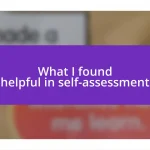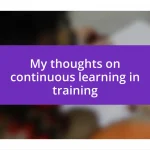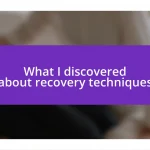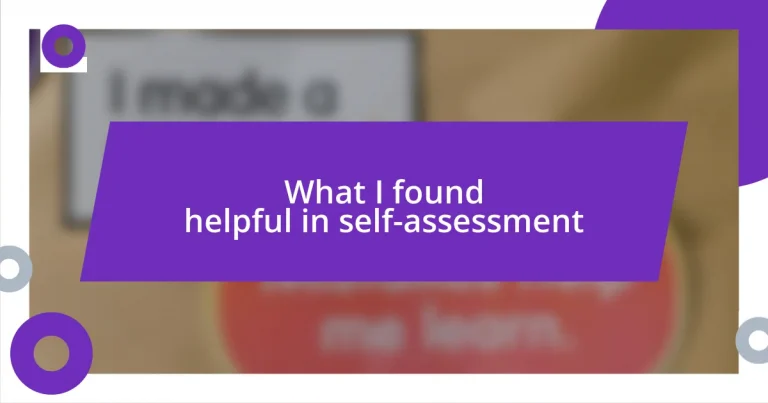Key takeaways:
- Self-assessment enhances personal growth by providing clarity, empowering ownership of one’s journey, and identifying areas for improvement.
- Effective self-assessment strategies include regular reflection, journaling, seeking feedback, and tailoring a self-assessment checklist.
- Maintaining progress post-assessment relies on integrating daily habits, seeking external support, and celebrating small victories to sustain motivation.
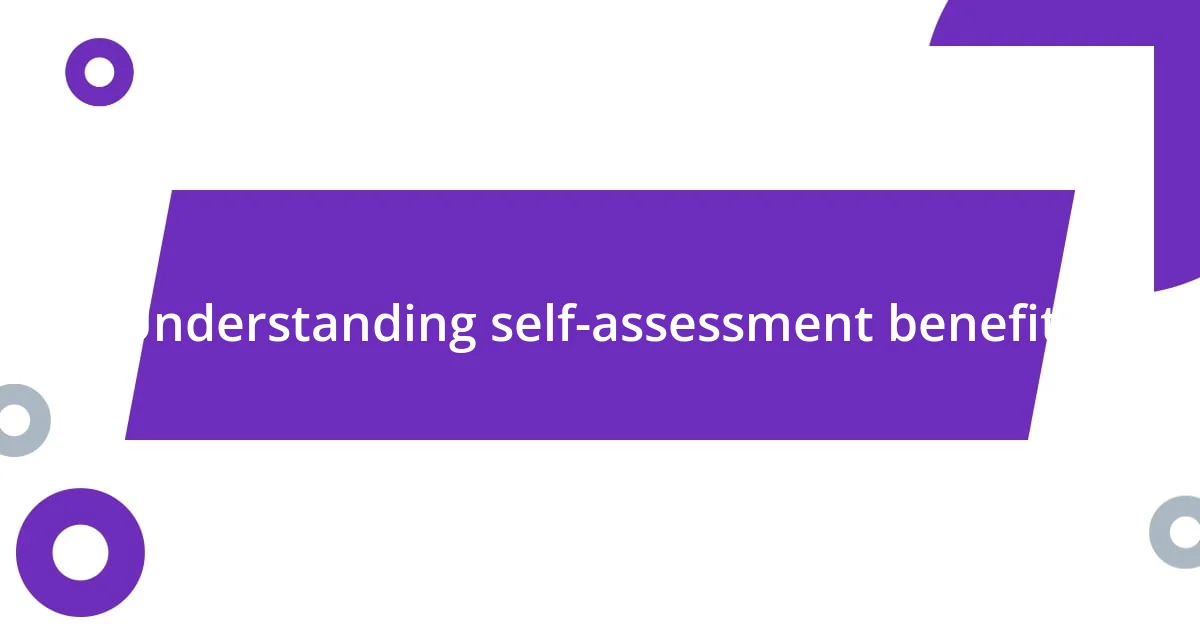
Understanding self-assessment benefits
Self-assessment offers a unique opportunity for personal growth. I remember the first time I sat down to reflect on my skills and experiences—it was eye-opening. I uncovered strengths I hadn’t acknowledged and areas I needed to improve. Don’t you think it’s fascinating how taking a moment for self-reflection can illuminate paths we never knew existed?
One of the most significant benefits I find in self-assessment is the clarity it provides. By evaluating my performance and feelings about certain tasks, I can identify what truly motivates and drains me. For instance, I once realized that I thrive in collaborative environments, which led me to seek out more teamwork opportunities. Have you ever considered how your work environment affects your productivity and happiness?
Another key benefit is the empowerment that comes from taking ownership of your growth. When I took control of my learning through self-assessment, I felt more motivated to pursue goals that aligned with my passions. What if we all embraced this practice? Imagine the shifts we could create in our lives simply by being more mindful of our journeys.
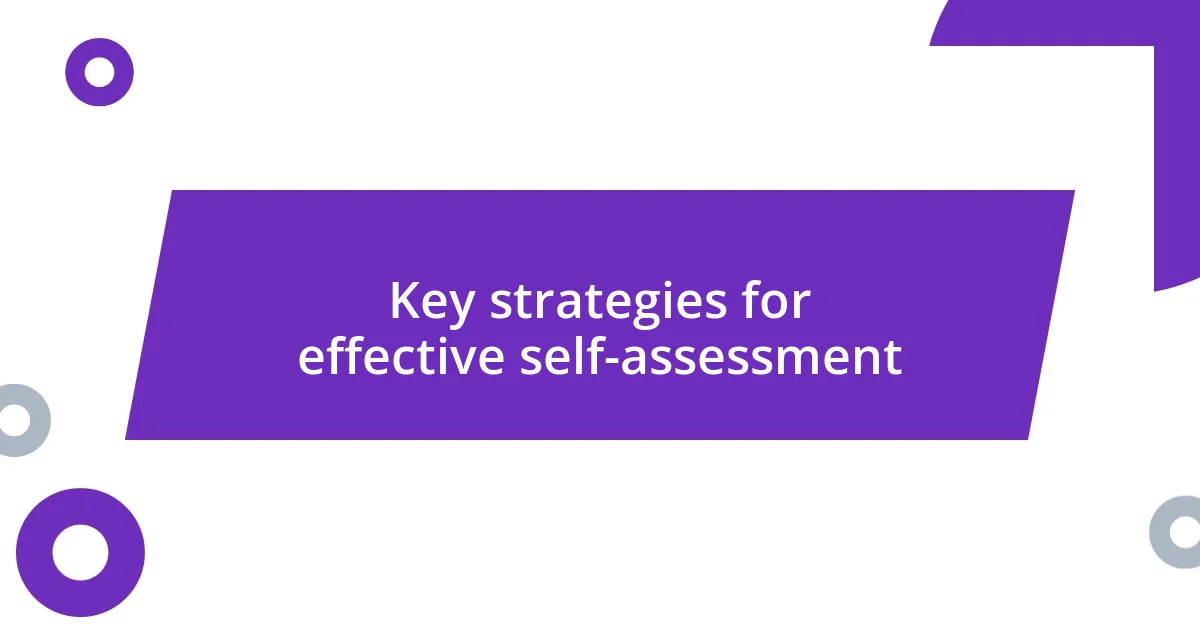
Key strategies for effective self-assessment
When I approach self-assessment, I find that setting specific, attainable goals is vital. It’s akin to navigating a map; without clear destinations, it’s easy to feel lost. I once set a goal to improve my public speaking skills. By breaking that down into smaller steps—like joining a local Toastmasters group—I not only became more confident but also found joy in sharing ideas with others. This structured yet flexible approach keeps me engaged and focused.
Here are some strategies that work well for effective self-assessment:
- Regular Reflection: Schedule time weekly or monthly to review your progress and feelings. This creates a rhythm of awareness that can lead to significant insights.
- Journaling: Write down your thoughts and experiences. It’s a powerful tool for capturing nuances that might slip away otherwise.
- Seek Feedback: Don’t hesitate to ask friends or mentors for their perspectives. This can unveil strengths you may have overlooked.
- Create a Self-Assessment Checklist: Tailor it to your needs; this could include skill areas, emotional wellbeing, or specific projects.
- Practice Mindfulness: Incorporate mindfulness techniques to help you become more present during self-assessment, enhancing clarity and focus.
Incorporating these strategies not only enriches my understanding of myself but also fuels my personal development journey. It’s a gratifying experience that can lead to transformative changes in how I approach life and work.
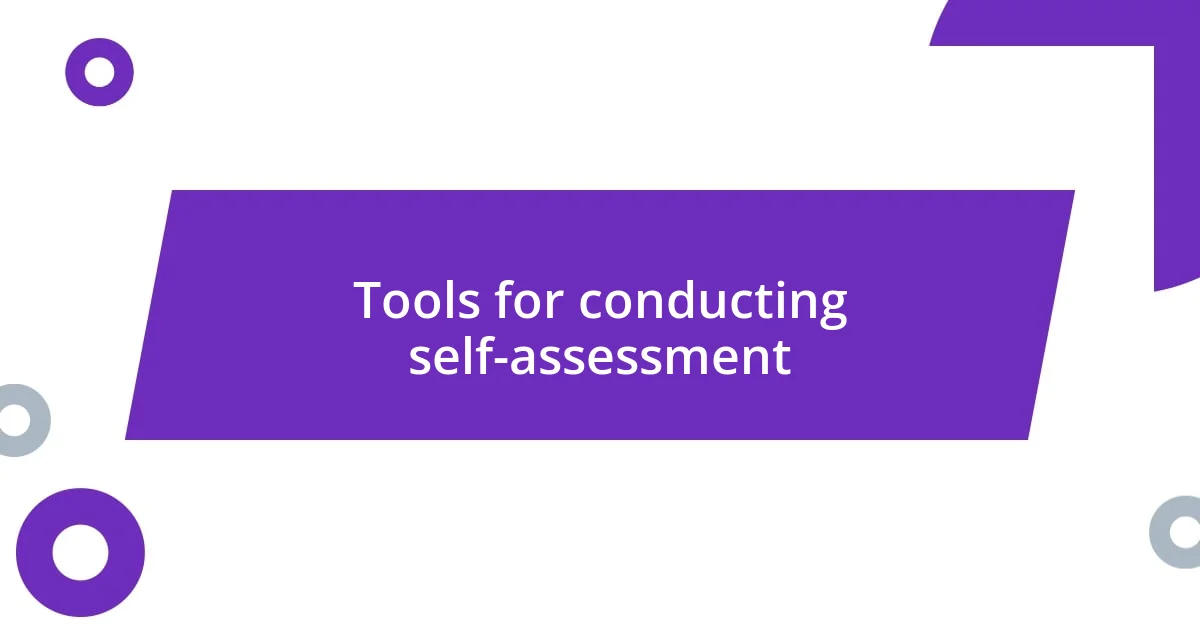
Tools for conducting self-assessment
Understanding the right tools for self-assessment can enhance the journey of self-discovery. I’ve found using structured frameworks like SWOT analysis incredibly helpful. By identifying my Strengths, Weaknesses, Opportunities, and Threats, I was able to gain a clearer perspective of my personal and professional landscape. It transformed my approach; instead of merely wishing for improvement, I could visualize a strategic path forward.
I also recommend using digital tools, such as online quizzes or personality assessments. For example, I once took the Myers-Briggs Type Indicator (MBTI) test. The results helped me understand my personality type and how it influences my decision-making and interactions. It’s a great reminder that the more insights we gather about ourselves, the more equipped we are to tailor our goals and engagements to match our true nature.
Finally, I find journaling to be an invaluable tool in my self-assessment repertoire. Reflecting on my daily experiences and emotions allows me to track shifts in my thoughts. I recall a time when I was struggling with uncertainty; writing about it unlocked feelings I didn’t know I had and led me to a profound realization about my career aspirations. What tools have you tried that foster deeper understanding of yourself?
| Tool | Description |
|---|---|
| SWOT Analysis | A framework to identify Strengths, Weaknesses, Opportunities, and Threats. |
| Personality Assessments | Quizzes like MBTI that provide insights into how your personality shapes your approach. |
| Journaling | The practice of writing regularly to reflect on thoughts, feelings, and experiences. |
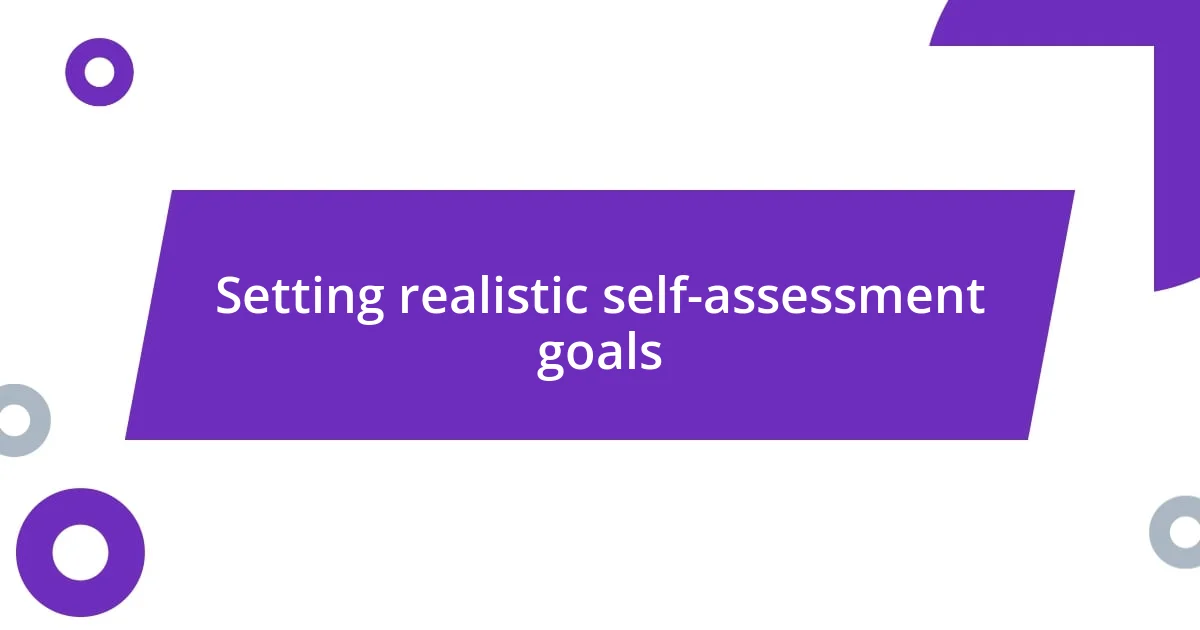
Setting realistic self-assessment goals
Setting realistic goals for self-assessment is pivotal to making progress. I’ve learned that aiming too high can lead to disappointment, while overly modest goals often don’t challenge us enough. For instance, when I aimed to read a book each week on personal development, I quickly found that life got in the way. Instead, I shifted my goal to reading just a couple of chapters a week. This adjustment felt much more attainable and kept my motivation alive.
I’ve also found success in defining goals that directly align with my daily routines. When I wanted to enhance my time management skills, I started by simply tracking my daily activities for a week to identify where my time was going. It felt like shining a flashlight into dark corners; the insights were illuminating! From there, I set realistic goals, like blocking out specific time slots for focused work, which made a tangible difference in my productivity.
Have you ever pondered what might happen if you focused on just one area of improvement at a time? I experimented with this approach during a particularly hectic season in my life. By concentrating on my communication skills, I found that dedicating a short, consistent effort each day led not only to growth but also built a solid foundation for tackling other goals later. It’s remarkable how manageable stepping stones can lead to expansive leaps in personal development.
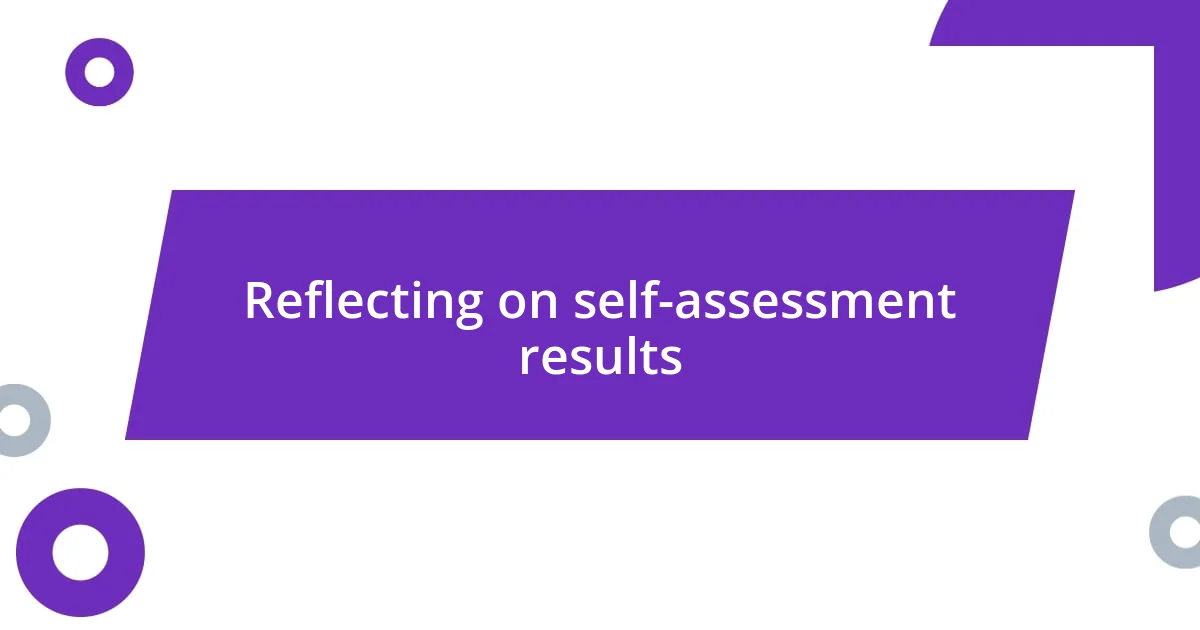
Reflecting on self-assessment results
Reflecting on self-assessment results can be a transformative experience. When I first delved into my assessment outcomes, I felt a mix of excitement and apprehension. I remember looking at my strengths and realizing just how underutilized they were in my daily life. Have you ever been surprised by what you learned about yourself? It’s an awakening that can spark both self-acceptance and a desire to change.
As I analyzed my weaknesses, it became clear that this wasn’t meant to be a moment of self-judgment but rather an opportunity for growth. I thought back to a project that didn’t go as planned; it highlighted not only my limitations but also a chance to seek help and improve my skills. Each weakness listed wasn’t a dead-end, but a doorway to new ways of thinking and acting. What if we acknowledged our weaknesses as guides rather than hindrances?
The opportunities I identified during reflection often felt daunting at first, but that’s where the magic happened. I recall one particular evening, sitting with my assessment notes, and letting the possibilities ripple through my mind. It was inspiring to think of the connections I could forge or the skills I could acquire if I stepped out of my comfort zone. I ended up setting a goal to attend networking events, and those initial nerves transformed into meaningful relationships that changed my professional trajectory. Isn’t it incredible how reflection can turn insights into actionable steps?
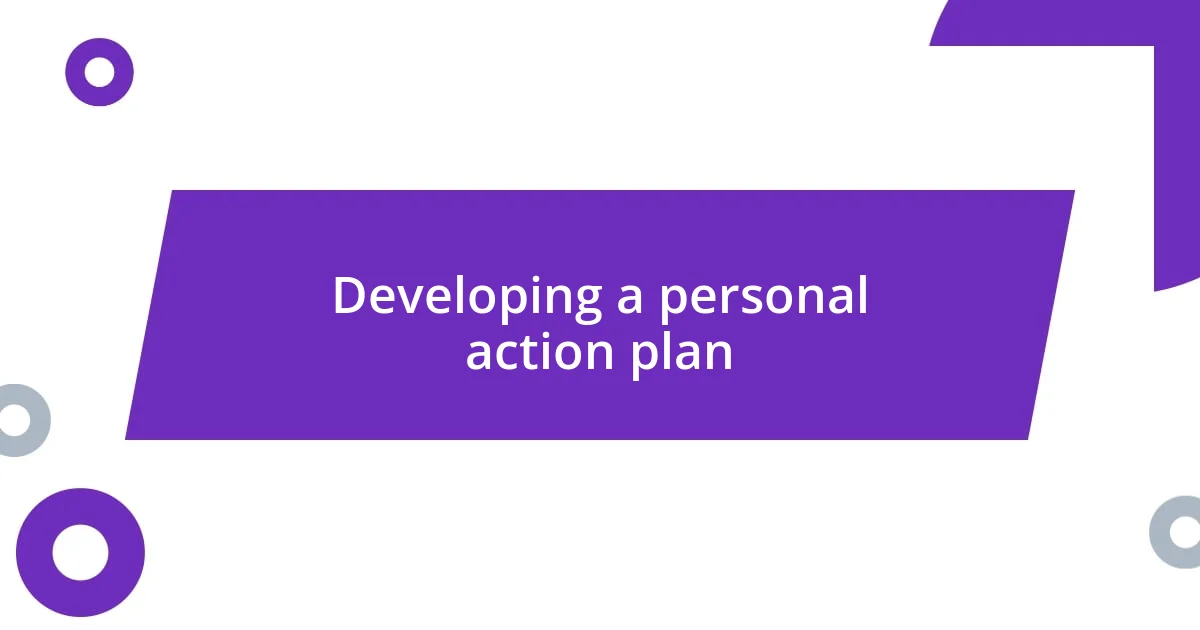
Developing a personal action plan
Developing a personal action plan is an essential next step after reflecting on self-assessment results. I recall when I first sat down to create mine; I had a big blank page in front of me and felt a mix of excitement and hesitance. Initially, I drafted a laundry list of everything I wanted to improve, but it quickly became overwhelming. Instead, I rearranged my priorities by focusing on just three key areas. This not only simplified the process but also made it feel more achievable. Hasn’t a narrow focus often led to greater clarity for you too?
While outlining my action plan, I made sure to incorporate tangible tasks that matched my goals. For instance, after identifying my desire to be more assertive, I planned to engage in at least one difficult conversation each week. I vividly remember the first time I spoke up during a meeting—my heart raced, but it spurred a rush of confidence that propelled me forward. Each small success built on the last, gradually reinforcing my commitment to this action plan.
It’s vital to revisit and adjust your action plan regularly. I learned this the hard way after realizing that some of my initially chosen goals became irrelevant as my circumstances changed. So, I started setting aside time every month to reflect on my progress. This practice allowed me to stay flexible and adapt my plan based on what was truly resonating with me. Have you taken the time to reconsider your paths? By staying responsive, I’ve transformed what felt like constraints into opportunities for growth and exploration.
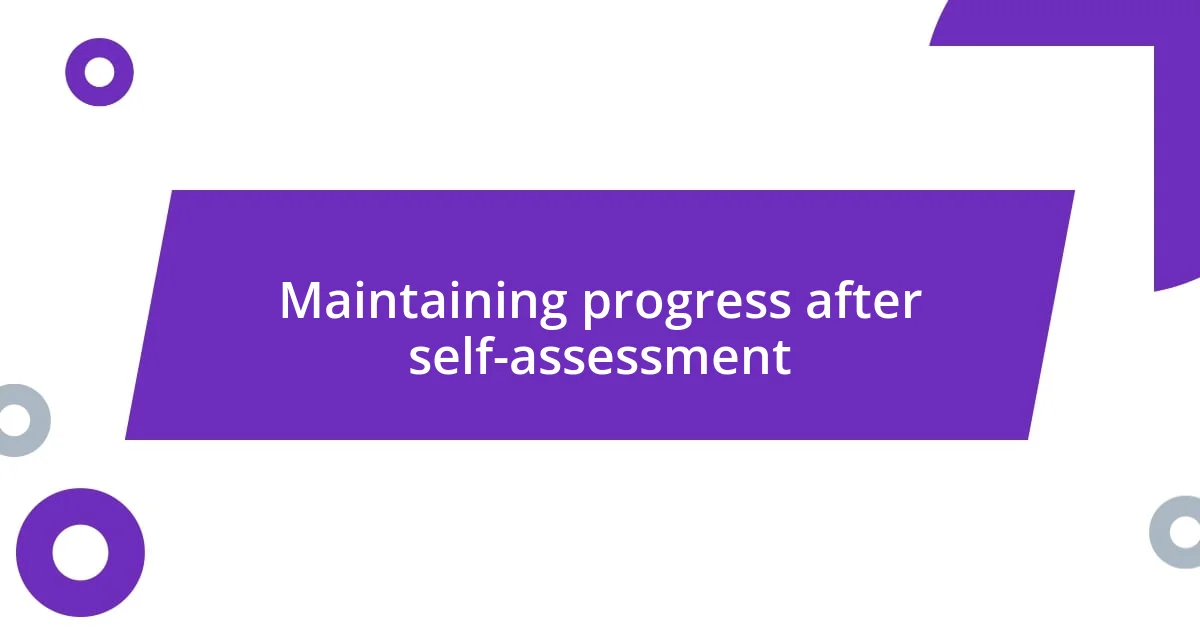
Maintaining progress after self-assessment
Maintaining momentum after self-assessment can sometimes feel like a balancing act. I remember reaching a point where I was excited about my action plan but unsure how to keep the energy alive. One trick that worked for me was integrating small daily habits that aligned with my goals. For example, I made it a point to read for thirty minutes each morning to sharpen my skills. This simple shift created a consistent rhythm that kept me moving forward, almost like a daily reminder of my aspirations.
Another strategy I found helpful was regularly checking in with a trusted friend or mentor. I can’t emphasize enough the value that outside perspective brought to my journey. Each time we met, I’d share my progress, along with any challenges I faced, and their insights often illuminated blind spots I hadn’t considered. Have you ever noticed how sharing your journey with someone can help clarify your thoughts? It’s like having a mirror reflecting back not just your triumphs, but also potential areas for growth you might overlook on your own.
I also realized that celebrating small victories plays a crucial role in sustaining progress. After completing a series of tasks related to my action plan, I took myself out for coffee or treated myself to a favorite show. These little rewards were not just fun; they reinforced the idea that progress, no matter how small, deserved recognition. Isn’t it motivating to give yourself a pat on the back? Making progress tangible through acknowledgment kept my spirits high and fueled my desire to keep pushing forward.





